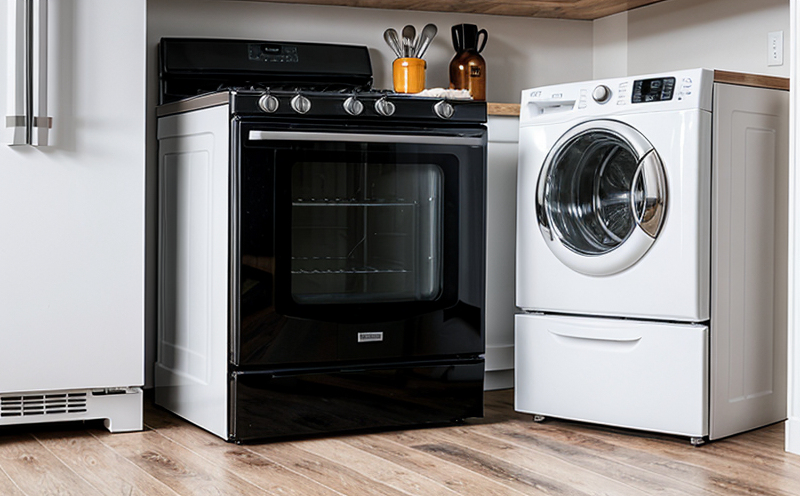First Section: Mechanical Strength Testing of Appliance Housing
The mechanical strength testing of appliance housing is a critical process that ensures consumer products meet safety and performance standards. This test evaluates the ability of an appliance's housing to withstand external forces, such as impact, compression, bending, or torsion without failure. The results are essential for product designers and manufacturers to ensure their appliances can safely perform under expected conditions in the home environment.
Consumer electronics and household appliances often come into contact with various stresses during normal use, transport, and handling. Mechanical strength testing helps identify potential weaknesses that could lead to product failure or even injury if not addressed early in the design process. By conducting this test, manufacturers can improve product reliability and user safety while complying with international safety regulations.
During mechanical strength testing, a carefully prepared specimen of the appliance housing is subjected to specific forces using appropriate equipment. The test aims to determine how much stress the material can endure before it deforms or breaks. This information helps engineers make informed decisions about material selection and design improvements.
The testing process typically involves several steps: selecting the correct loading configuration, preparing the specimen according to industry standards (e.g., ISO 7254-1 for plastic housing), applying the prescribed load incrementally until failure occurs or specified deformation is achieved. The test setup may include various fixtures depending on the type of force being applied, such as a universal testing machine or a drop weight tester.
Once the test is complete, detailed reports are generated that document all relevant data points including maximum load capacity, deflection measurements, and any visual signs of damage. These results provide valuable insights into product performance and help guide future iterations of the design. Compliance with specific standards like IEC 60335-2-8 ensures consistent quality across different models within a brand’s portfolio.
Understanding the importance of mechanical strength testing allows companies to prioritize safety features in their products, thereby enhancing customer trust and satisfaction. Additionally, this service supports businesses in meeting regulatory requirements set forth by organizations such as Underwriters Laboratories (UL) or European Conformity (CE). Properly performed tests not only protect consumers but also contribute positively towards brand reputation.
In summary, mechanical strength testing of appliance housing plays a pivotal role in ensuring the safety and durability of consumer goods. By incorporating this vital step into their development cycle, manufacturers can create reliable products that meet both regulatory expectations and market demands.
Industry Applications
Mechanical strength testing is widely used across various industries where robust construction materials are required for functional components or structures. In the context of household appliances, this service ensures that housings can safely withstand everyday wear and tear without compromising on aesthetics or functionality.
The application spans multiple sectors including electronics manufacturing, home appliance production, and industrial equipment fabrication. For example, when designing a washing machine drum or a refrigerator door, it is crucial to understand how much weight the component will bear during regular use, accidental drops, or transportation. Similarly, in the case of vacuum cleaners or air conditioners, robust housing design helps prevent damage from rough handling.
Manufacturers rely on rigorous testing protocols to validate their designs against real-world conditions. By simulating different loading scenarios, they can pinpoint areas needing improvement and implement necessary changes early in the production cycle. This proactive approach leads to more efficient manufacturing processes and ultimately contributes to reduced costs associated with recalls or warranty claims.
Moreover, compliance with relevant standards such as IEC 60335-2-8 for household appliances ensures that products meet international safety requirements while also gaining market access in different regions. This alignment not only enhances brand reputation but also fosters consumer confidence in the quality of goods they purchase.
Eurolab Advantages
At Eurolab, we offer comprehensive mechanical strength testing services tailored specifically for household appliances. Our state-of-the-art facilities and experienced technicians ensure accurate results that meet or exceed industry standards.
We employ advanced instrumentation capable of simulating real-world stresses on appliance housings. Using high-precision load cells and displacement sensors allows us to measure even the slightest changes in material behavior during testing. This level of accuracy is crucial for identifying subtle flaws early in the design process, which could otherwise go unnoticed if not properly monitored.
Our team of experts has extensive experience working with leading manufacturers across various sectors. We stay abreast of emerging trends and technological advancements to provide cutting-edge solutions that address current challenges faced by our clients. Whether you need assistance optimizing an existing product line or developing new prototypes, Eurolab offers personalized support throughout every stage of your project.
Additionally, we offer fast turnaround times with flexible scheduling options to accommodate busy workloads without compromising on quality. By partnering with us, you gain access to dedicated resources that are committed to delivering exceptional service and unparalleled expertise in mechanical strength testing.
Why Choose This Test
The decision to conduct mechanical strength testing of appliance housing offers numerous benefits for manufacturers seeking to enhance product quality and safety. One key advantage lies in its ability to identify potential weaknesses early on, allowing for timely corrections before mass production begins.
By incorporating this step into their development cycle, companies can minimize risks associated with unforeseen failures during use or transport. This reduces the likelihood of costly recalls down the line while improving overall brand reputation among consumers who value reliability and longevity in their purchases.
Moreover, compliance with international standards such as IEC 60335-2-8 provides a strong foundation for entry into global markets where stringent regulations apply. Meeting these requirements not only simplifies export procedures but also demonstrates commitment to maintaining high levels of safety and performance throughout the product lifecycle.
In conclusion, mechanical strength testing is an indispensable tool in ensuring robust construction that meets both functional and regulatory expectations. By investing in this service early on, manufacturers can create products that stand out in today’s competitive market while fostering long-term relationships with satisfied customers.





